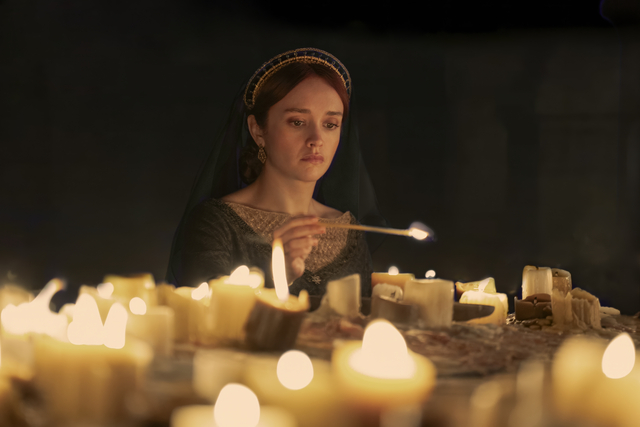
Olivia Cooke, @Courtesy of by Ollie Upton/HBO
House of the Dragon: Based on George R.R. Martin’s “Fire & Blood,” the series, set 200 years before the events of “Game of Thrones,” tells the story of House Targaryen.
Season two returning cast: Matt Smith, Olivia Cooke, Emma D’Arcy, Eve Best, Steve Toussaint, Fabien Frankel, Ewan Mitchell, Tom Glynn-Carney, Sonoya Mizuno, and Rhys Ifans. Additional returning cast includes Harry Collett, Bethany Antonia, Phoebe Campbell, Phia Saban, Jefferson Hall, and Matthew Needham.
Season two new cast: Abubakar Salim as Alyn of Hull, Gayle Rankin as Alys Rivers, Freddie Fox as Ser Gwayne Hightower, Simon Russell Beale as Ser Simon Strong, Clinton Liberty as Addam of Hull, Jamie Kenna as Ser Alfred Broome, Kieran Bew as Hugh, Tom Bennett as Ulf, Tom Taylor as Lord Cregan Stark, and Vincent Regan as Ser Rickard Thorne.
Season two credits: Co-Creator/Executive Producer, George R.R. Martin; Co-Creator/Showrunner/Executive Producer, Ryan Condal; Executive Producers Sara Hess, Alan Taylor, Melissa Bernstein, Kevin de la Noy, Loni Peristere, Vince Gerardis. Based on George R.R. Martin’s “Fire & Blood.”
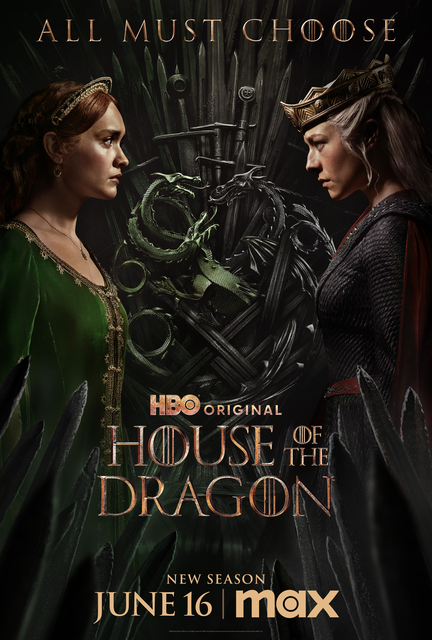
©House of the Dragon, Courtesy of Max
Press Conference with Actors Olivia Cooke, Tom Glynn-Carney, Phia Saban, Fabien Frankel, Ewan Mitchell, Matthew Needham and Creator Ryan J. Condal
Q : About all of the shows you’ve worked on previously, what’s been the most valuable experience for you in coming together for House of the Dragon?
Ryan J. Condal: Probably my last show, just because I did a lot of film writing early in my career. That’s great fun, but you tend to write those feature screenplays and then hand them over, and then they either make them or don’t make them. They don’t tend to involve the writer much in the production though. I think the best training for making TV is making TV. My first show was Colony, done with Carlton Cuse. That was essentially my television school, I got dropped into it and had to keep my feet moving. It was a smaller scale, but essentially problems are the same, either big or small but it tends to be the same making a smaller TV show and then something like this.
Q : In Season 1 the scope of the show constantly expanded and built upon itself. How did that set the stage for the way that created the scope of Season 2?
Ryan J. Condal: When we started working on Season 1 five years ago, we already knew we wanted to end the first season with that climax because we felt like that was the proper moment that sort of catalyzed everything else that followed. The real question was how do you build up to that moment and have it not only land as a moment of spectacle and shock, but something truly rooted in the many years-long character dynamics that we’ve been setting up since Rhaenyra and Alicent were children. We felt like if we did that and then that moment would land with the impact that I think it did, then we’d be off to the races. And then at that point, people were going to be invested and I think that’s where we are right now. Season 2 picks up a couple of days later and off we go to the next horrible tragedy.
Q : Speaking of tragedy, there were huge losses at the end of Season 1 in terms of characters. How has that influenced the way that you wrote this season?
Ryan J. Condal: It’s a point of no return. You have these two sides that share a lot of common history and hate each other, it only gets worse as things go on and the tragedies pile up. Vhagar killing Luke is the big change in the way things are going to be looked at, and then what’s the counterpunch? What’s the counter-response to that? We just wanted to set all that stuff up so that you know all of the characters and understand where they’re coming from, what makes them weak or strong, what they want or what they love, and then throw them into the mix and see how they respond.
Q : At the end of the day, it’s all about the relationships of these characters. How do you set about creating a balance between a larger-than-life show and vulnerable human emotions?
Ryan J. Condal: That’s the trick of the job. It’s television, we are trying to tell these big stories that are often about human conflicts. The things I’m proudest of in the show are often two characters in a room in conflict with one another. If you’re making the show 8 episodes, which amounts to about 9 hours of television, you can’t fill it all with dragons fighting each other. You have to have these kinds of stage stories. The things I think people engage with most are the character levels. So when the spectacle comes, if you’ve done your job right, you care about the characters involved with the spectacle and that’s why you take up this emotional experience out of it.
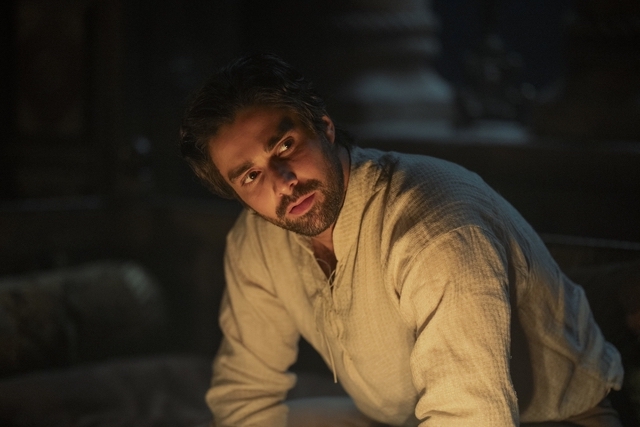
Fabien Frankel, @Courtesy of by Ollie Upton/HBO
Do you think the events of Season 2 could make characters switch teams?
Tom Glynn-Carney: I’m sure we’ve all got thoughts. You’d hope that the narrative is still malleable and people can swap and change. The idea is that you could watch one episode and be Team Black and then watch a different episode and be Team Green. But that’s the excitement of it, the unpredictability of it.
Q : Is that the same thought for the rest of you?
Olivia Cooke: We’re so biased at this point. We sort of bleed green and we have loads of fun. So I can’t possibly comment.
Phia Saban: Because the only time on set we spend is filming our scenes, watching the show is going to be my first time seeing the Team Black point of view. Like who knows, maybe I’ll be like” Oh, they’ve got a point!” But to me, the show is just about us.
Q : Can you talk about Alicent’s growth through understanding the power that she yields and how she manipulates it, even though a lot of people see her as weak? How much fun has it been portraying that?
Olivia Cooke: It’s hard because I don’t see her as vicious. I think she’s got a point a lot of the time. She’s sort of got to manipulate to get her point across, to sort of steer these men away from chaos and implosion. In Season 1 you definitely saw her as the naïve girl and that indoctrination from her father has like set in; She becomes this mini-Otto Hightower in a way. And at the top of Season 2, she’s the most powerful she’s ever been, her son sits on the iron throne. Now she is seeing her two full-grown sons who are beginning to dismiss her more and more.
Q : Is George Martin involved now that you’re going into the second season?
Ryan J. Condal: Well, he wrote the book, so in that way, he’s always with us. He’s very busy working in this massive universe. They want to make many more shows about this world. He’s aware of what’s going on, I do keep in contact with him. But I think now that we’re kind of off to the races with the show and we’ve done a good job about rendering Fire and Blood into dramatic form, we’re operating on our own now, in a good way. But George always looms large in the background of House of the Dragon.
Q : In what way has Season 2 been different compared to the first one?
Fabien Frankel: The new actors that have come are just so talented, although we miss Paddy so much and the actors that we lost, Bill Paterson and others, these new guys have come in and been like such a welcome addition. And I’m so excited for everyone to see everything they’ve done.
Ewan Mitchell: That was one of the joys of joining later in Season 1. It was like joining a family that already existed. There were no first-day nerves from those guys. And so you didn’t really feel it either. You made us feel very comfortable and I appreciate it, thank you.
Q : Coming off of such a well-received first season for the whole cast and crew, how much anxiety or fear comes from wanting to not just recreate the magic, but also finding new ways to elevate the story and process?
Matthew Needham: There’s a lot of pressure. It was so well received that it is a second album, isn’t it? We don’t want to disappoint anybody. Everybody in every department is working as hard as they can to make it as good as they can because we don’t want to let anyone down. We’re really excited for you all to have a look at it.
Ryan J. Condal: My anxiety in Season 1 was if anybody was going to watch the show. Because we were following the most successful television show of all time. How do you follow that? You don’t. You just try to make something good that stands on its own. That was the challenge in Season 1 so fewer nerves are going into Season 2, even if we also have to outdo ourselves, because that’s the expectation set before us. How do you do that? Thankfully I have this lovely Team Green, to make us all look good.
Olivia Cooke: Are you Team Black or you Team Green, Ryan? That’s the question…
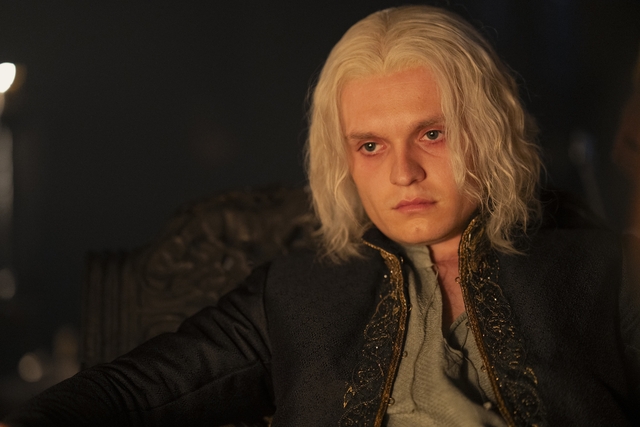
Tom Glynn Carney, @Courtesy of by Ollie Upton/HBO
Q : You are portraying such richly complex characters in a very complicated story. How do you keep track of where you are when you’re working?
Fabien Frankel: Very good continuity people tell us where we are at each point. You can always go to the monitor and you’ll find Tess there, our script supervisor chewing gum, she’ll tell us exactly what’s just happened, what’s about to happen. Because you shoot it completely out of order, it’s very useful, you hope that you’ve not completely forgotten that you’re supposed to be out of breath, which I didn’t do for example in Episode 3.
Tom Glynn-Carney: It’s useful in terms of knowing your whole character arc, it’s always useful for me to have some form of timeline. Read the scripts and take out those landmark moments in your character’s progress. Remember where those are how they shift you and how that informs your decisions as you play the character. But you have to be present in the scenes, and do your own job if you just let it happen. Without the help of Tess and our script supervisors, the continuity team, and all, we’d be lost in the woods somewhere.
Q : Why do you think after so many years, even decades, those stories hold audiences so captivated by it?
Ryan J. Condal: They’re just incredibly well-crafted stories and characters. This world is so textural and well-realized that it feels real. Fire and Blood, which is a fake history book – George’s words, not mine – it’s incredibly engaging because it’s so textural. This is no secret, but Fire and Blood, this particular story is based on the Anarchy, which is a famous and very bloody conflict that happened in English Medieval history. Those little touchpoints that connect to real history make it feel real versus coming into a world that’s entirely fantastical and entirely made up. It does feel like it actually happened in a lot of ways.
Ewan Mitchell: The first season was shot over a long time during circumstances that the whole world felt. We were kind of plunged into the unknown with the pandemic. It’s brilliant that HBO was able to give back a world to the audience that they knew. Instead of being surrounded in this world of the unknown, you know a Targaryen is going to be a Targaryen; you know a Baratheon is going to be a Baratheon. That familiarity during uncertain times was certainly something our audience could hold onto.
Q : The fan interaction and the reaction to this show is quite intense. How much does that affect where you go in the story or how you portray your character?
Olivia Cooke: You have to try and not let it affect your performance, a lot of fan theories are really intoxicating and fun. But we’ve got beautiful scripts from Ryan and Sarah and the team and we have to be loyal and monk-like to the text.
Q : You’ve said in the past that your character has kind of a darkness to him. Do you feel like that’s coming to the foreground even more this season?
Fabien Frankel: How much have you guys seen?
Ryan J. Condal: I’ll just scream if you cross the line…
Fabien Frankel: I can’t remember who it was, someone said to me at the end of last year: “I hope you’re looking forward to being the most hated character on television.” So we’ll see.
Ryan J. Condal: Cole is a character that’s always fascinated me because he’s rare for this world because he’s a self-made man. He’s got to where he got based on his talents and not whose son he was or where he was born. He’s embraced that and he wears this white cloak like it’s a millstone around his neck. He’s quite proud of it, but there is also this burden that he carries. Whatever you think of Cole, he’s a deeply interesting character in that way. Now that we’ve moved from peacetime into wartime, it applies very interesting pressure to his character. I love where the show has taken it and what Fabien has done with the role.
Q : Aegon was reluctant to step into a leadership role and now we’re getting to see what it looks like as he tries to find his footing. What has that journey been like for you?
Tom Glynn-Carney: It has been exciting to work it out with Aegon as he’s been working out. It was important to me to find somewhere to go with him. We see him at the start of Season 2 with a little bit more of a spring in his step, he’s walking two inches higher than he would have usually been. He’s stepped into these kingly shoes with enthusiasm. We see a little shift in him at the end of Season 1. The guy’s riddled with insecurities and vulnerabilities and everything that fractures a person. We’ll see how long he holds together.
Q : Even Aemond has had a lot of insecurities. He’s someone who’s always struggled to find his footing even within his own family. How do you feel like that’s going to influence him further in Season 2?
Ewan Mitchell: He was the only kid in the family who wasn’t given a dragon egg growing up. He was on the back foot and there’s this dynamic as the person grows, so does the hatchling, they’re very much extensions of each other. Aemond didn’t get an egg and he was bullied for being different. Vhagar is the oldest, baddest, hardened dragon in the known world, she’s so enormous she can’t fit within the confines of any castle wall and that’s similar to Aemond. He can’t fit in anywhere either. And so they’re able to identify with each other. That idea of standing in the face of adversity, a 10-year-old claiming this behemoth, it’s a tremendous sign of courage. Going into Season 2 you’re going to see that drive continue and it’s going to be scary.
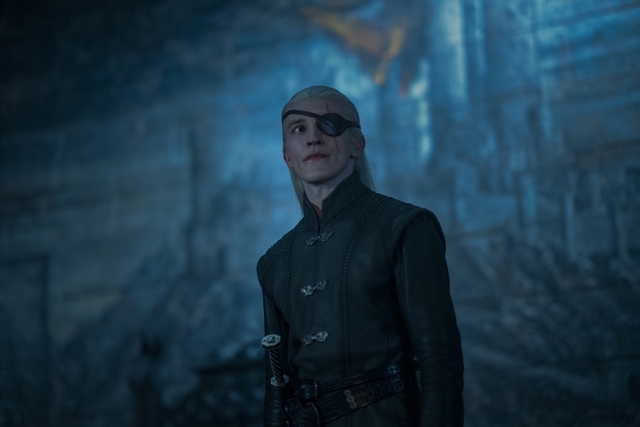
Ewan Mitchell, @Courtesy of by Ollie Upton/HBO
Q : What were the two most challenging sequences that you created?
Ryan J. Condal: I can’t talk about those scenes in Season 2 yet. We have two sequences that we did this year that are the biggest thing certainly I’ve ever been a part of. They outstrip the size and scale of anything we did in Season 1. Some people here in this room might have participated in one or more of them. I’m excited for you guys to see them.
Q : What were the new challenges you faced by giving life to this new arc of your character this season?
Olivia Cooke: What to do with one’s face when you’re portraying different kinds of grief and trauma throughout, how to play those varying levels of sadness.
Ryan J. Condal: I think you’re underplaying your skills and abilities. Alicent is forced to kind of come to reckon with the fact that the thing that she was sort of groomed to do since she was 14 years old, by her father, which is to lift the greatness of her own house, she’s done that and now she’s had a son who’s a king. And in doing so has diminished her power because the minute Aegon wears the crown, Alicent’s power as queen is reduced, because she’s no longer the queen of the Seven Kingdoms. She’s now the queen that used to be. She probably didn’t realize at the moment how much of a power shift that is. This new season, so much of what Alicent experiences is reckoning with this thing that she was sort of made to do her entire life, did it, accomplished it and then how it landed on her and what that means.
Olivia Cooke: Yeah, she’s sort of like being forced into an early retirement, in a way.
Ryan: Olivia is brilliant. Alicent and Rhaenys arcs take very different directions this year. This was a hard task that we laid before her and she did a brilliant job with it and I’m very, very proud of the work and excited for you guys to see it.
If you like the article, share your thoughts below!
Check out more of Adriano’s articles.
Here’s the trailer of the series.

